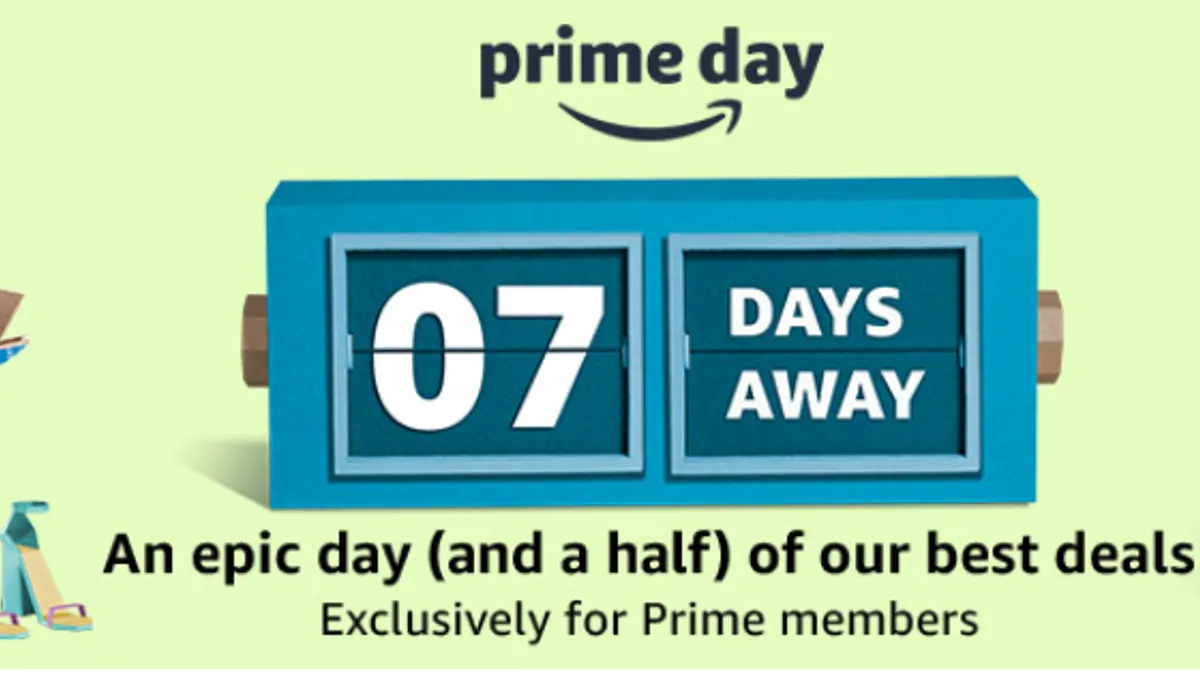Dive Brief:
-
Amazon Prime Day, longer this year at 36 hours compared to 30 last year and 24 the previous two years, is poised to reach at least $3.4 billion globally, a 40% increase compared to Prime Day sales estimates last year, according to a study from retail think tank Coresight Research emailed to Retail Dive.
-
That’s conservative, Coresight said, because the e-commerce giant’s promotional period will go longer this year. Electronics, especially the e-retailer’s smart speakers, and Amazon’s private labels will be emphasized, Coresight said. Prime Day will also be a feature in more places around the world, according to the report.
-
So far deals are shaping up to beat even blockbuster Black Friday prices, according to another report from deal site BestBlackFriday.com, emailed to Retail Dive. At least 70% of comparable Prime Day prices are expected to be better than Black Friday last year, according to that report.
Dive Insight:
Prime Day is a chance for Amazon to solidify its position in the smart-home market while continuing to grow its Prime membership. "We interpret the focus on promotional activities on Echo devices as a strategy in response to the surge in competition in the smart speakers/smart home space, especially from competitors such as Google with its Google Home devices," Coresight Research CEO and Founder Deborah Weinswig wrote in the report.
But Amazon is also taking the opportunity to promote its private labels, particularly in furniture, home, grocery and apparel, Coresight noted. The retailer has announced exclusive Prime Day offers on its brands, including 25% discounts on furniture and decor from Rivet and Stone & Beam, up to 20% off Amazon Basics items and 30% off everyday essentials from Presto!, Mama Bear and Solimo, according to Coresight. Amazon has even more private labels than have been singled out by analysts according to research last year from branding analytics firm Gartner L2. Many private labels were introduced to capitalize on holiday spending, and new brands have been introduced since, including pet goods.
Much is made of Amazon's private label prowess, but analytics firm Jumpshot last month presented a mixed picture. AmazonBasics accounts for 88% of its private label conversions, and it leads only in electronics (dominating nearly half of those sales), according to that report. Take out AmazonBasics and the e-commerce giant owns just 7% of conversions market share. "Amazon doesn't have private labels cracked," the report noted.
Other retailers are increasingly benefiting from Prime Day. Electronics retailers in particular this year have increased assortments by 30%, and since the beginning of June their average discount per product has widened by four points, from 32% to 36%, according to research from LovetheSales.com emailed to Retail Dive — even Apple boosted discounts by 24%. Last year, by contrast, the volume of discounted products in June was flat, according to that study.















